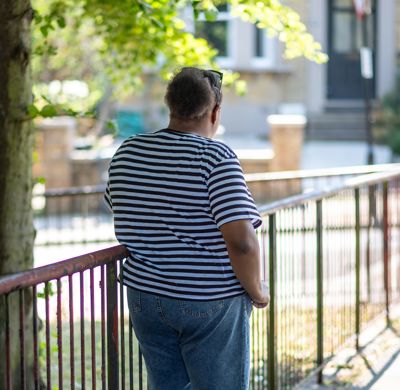"When Christian became ill, it hit me like a ton of bricks" - Georgie's story
10/06/2024
Georgie, who lives with depression and anxiety, has been supporting her son through schizophrenia for nearly 35 years now. For Carers Week, she shares the impact stigma has had on her son’s life and offers helpful advice for carers in similar circumstances.
Mental illness, particularly schizophrenia, is mostly talked about in hushed tones. I feel ashamed to admit that during the early years if someone asked me, ‘What’s wrong with your son?’ I’d cautiously whisper, ‘He suffers with his nerves.’ These days, I educate people about this very misunderstood condition.
When Christian became ill, it hit me like a ton of bricks. The first seven years were horrendous. To develop schizophrenia at any age is devastating, but it’s harder if you’re only 15. Chris had no experience of work, socialising, driving, relationships. We were either incredibly sad because he was spending his life in bed or absolutely terrified by him hearing voices or seeing things.
He was, still is sometimes, plagued by his thoughts, moods or feelings and this in turn affects, or should I say ‘infects’, his loved ones. It’s almost as if a light goes out and we’re left frantically searching for the switch.
Stigma is a massive problem and until I feel confident enough to say ‘my son suffers from schizophrenia’ without the fear of ignorance, I will never rest. I’ve been asked many times if my son is violent. People just assume that people living with schizophrenia are axe-wielding maniacs. I want to be able to say this word without seeing that look of confusion and fear on people’s faces.
-
To develop schizophrenia at any age is devastating, but it’s harder if you’re only 15.
The impact of stigma
Just before Chris moved into his flat, 100 residents (his new neighbours), staged a protest at the local junior school across the road. They sent letters to the local paper saying that they objected to the mentally afflicted living near them and the school.
Bear in mind that our son had been living away from home and in hopsital for almost five years, and he’d been to hell and back. Chris read the letters and found it really difficult to understand why they’d object to him living there, especially as they didn’t even know him.
Around six months after Chris moved into his flat, he decided he’d like to go swimming. We were really pleased because he loved to swim before he became ill, and we all know that physical exercise improves our mental health.
One day, Chris rang me after work, shivering and crying. To my horror, I found out two police officers had called him out of the pool and asked him why he was in there. Someone felt it was necessary to call the police, to ‘protect the children’ because Chris disclosed to the lifeguard that he had a mental illness. If my son had been sitting in a wheelchair, I believe no action would have been taken.
Christian refused to go swimming for the next ten months. When I suggested he went, he’d say, ‘I can’t go, I feel ashamed.’ The incident affected him so badly that he became very depressed and was prescribed antidepressants.
-
People just assume that people living with schizophrenia are axe-wielding maniacs.
My advice for carers
Any mental health carer will tell you that when someone you love becomes mentally ill, you go through many stages before you finally reach acceptance.
- Carers need counselling to help them come to terms with their loss. One of our doctors suggested that Chris and I attend family therapy sessions, as well as a carers’ group which I attended for three years. Carers find comfort in each other.
- Having someone take the time to talk over the past has helped me to work through things and take stock of my own behaviour, emotions and feelings. Therapy is about understanding, whereas blaming is both unhelpful and destructive. All of this has helped the whole family to cope.
- Salvaging your own support could be done by explaining the condition to friends and family. Hold your own family conference and invite as many people as you can. By getting as many family members as possible together right at the start, we can at least attempt to gather their support. Teaching others will provide them with the understanding that they’ll need to support you.
- You can find ways to help yourself. It doesn’t matter what does it for you, as long as it helps. Paul, my husband, says that the colours of the flowers and plants manage to lift his spirits. He loves the springtime when he can get out there in the fresh air.
- Find out about legal rights, either as a carer or for the person you’re supporting. Ask professionals questions: What advice/help can you offer me to deal with this situation? Can I see a copy of the care plan? Can the family be involved in discussions concerning his/her treatment (assuming that they do not have any objections)? Is there a family therapist we can be referred to?
If you ask any carer, ‘what is your greatest wish?’, they’ll say, ‘for my son/daughter (whoever they are caring for) to have a better quality of life.’ Over time, Christian’s quality of life has changed dramatically for the better and we no longer feel terrified of what we might have to go through next.



